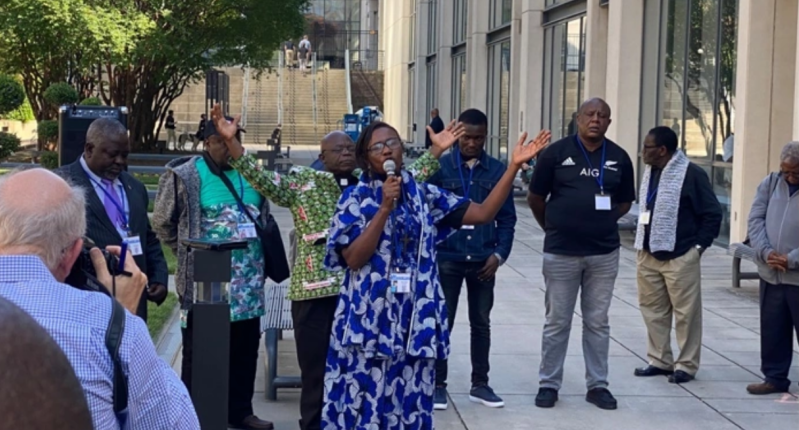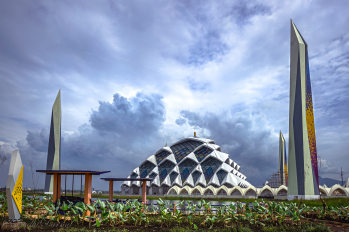
A group of African delegates to the United Methodist Church General Conference have denounced the recent votes to allow for same-sex marriage and noncelibate LGBT clergy.
This week, delegates at the UMC General Conference in Charlotte, North Carolina, passed a series of measures removing from the Book of Discipline rules preventing the officiating of same-sex weddings and the funding of LGBT advocacy groups.
On Thursday, the churchwide legislative gathering voted 523 to 161 to remove from the Book of Discipline the statement that the "practice of homosexuality is incompatible with Christian teaching," which had been originally added to the rule book in 1972.
Rob Renfroe, publisher of the theologically conservative Good News Magazine and attendee of the General Conference, forwarded The Christian Post a copy of Thursday's statement from several African delegates.
"We have loved The United Methodist Church. We have been grateful for The United Methodist Church. We have joyfully served The United Methodist Church. But now our hearts are troubled," read the statement.
"The United Methodist Church has changed the definition of marriage. It now defines marriage differently from what God created it to be in the beginning. It has changed the definition of marriage from how Jesus described it in Matthew 19 as one man and one woman."
The delegates assert: "We do not believe we know better than Jesus. We do not believe we know better than God. We do not believe we know better than the Bible."
"We are devastated now to be part of a denomination that officially contradicts the Bible's teaching on marriage and sexual morality. We return to Africa with important decisions to make regarding the future," they continued.
"Still, we go home full of hope, confident in Jesus, standing on the word of God, and determined to contend for the faith once and for all delivered to the saints. We return to Africa where the church is growing, nonbelievers are coming to faith and disciples are being made for the glory of our Lord Jesus Christ."
The African delegates blamed the UMC establishment for failing to properly invite 70 African delegates in time for them to travel to the General Conference, further biasing the proceedings.
"That is roughly 25% of our delegates. Ten months ago we began sending letters and emails and making phone calls, alerting the Commission on General Conference and some of our bishops that there was a problem. Many of these communications never received a single response," the statement alleged.
The statement was signed by the Rev. Jerry P. Kulah, head of the Liberia Annual Conference delegation; Prosperous Tunda, delegate of the East Congo Annual Conference; the Rev. Danjuma Judi, delegate of the Nigeria Annual Conference; Dr. Yeabu Kamara, delegate of the Sierra Leone Annual Conference; and Ginford Dzimati, delegate of the Zimbabwe Annual Conference.
CP reached out to the UMC for comment on the claims. A spokesperson emailed a statement from Bishop Tracy S. Malone, president of the UMC Council of Bishops and resident bishop of the East Ohio Conference.
Malone, the first African American woman to be president of the UMC Council of Bishops, said the delegates who signed the protest statement "do not speak for all the African delegates who are here at General Conference."
"The staff of the Commission on the General Conference made every effort to get each delegate from the African region to the General Conference who had a right to be seated," she explained.
"The Committee on Credentials reported to the General Conference and confirmed such efforts. The delegates from the African region who are here are fully engaged in all decisions being made. The delegates who are not here were not able to travel due to not receiving visas and other circumstances that prevented them from being here."
Malone said the UMC is "a worldwide church" that embraces "our diversity and respect our cultural, contextual, and theological differences."
Malone cited the regionalization measure that passed during the General Conference. This measure will allow different regions of the global denomination to determine their stance on LGBT issues. It must still be ratified by a majority of annual conferences before it can be added to the UMC constitution.
"The regionalization legislation that overwhelming passed confirms this visible unity and witness," she added. "The Social Principles legislation that expands the definition of marriage that overwhelming passed also confirms this unity and diversity and respects our cultural and contextual realities."
A UMC spokesperson also forwarded CP a brief statement from Bishop Eben Nhiwatiwa of the Africa Central Conference, Zimbabwe Episcopal Area, who expressed support for Malone.
"We want to go on record to say that the majority of the African bishops who are here at General Conference, support this statement from Bishop Malone," stated Nhiwatiwa.
For the past several years, the UMC has been dealing with divisive debate over the Book of Discipline's stance on LGBT issues. While efforts to change the language at past General Conferences had always failed, many liberals refused to enforce or follow the rules.
In 2019, at a special session of the General Conference, delegates passed a temporary measure that created a process for congregations to disaffiliate from the UMC over the debate. More than 7,500 mostly conservative churches left the denomination from 2019 to 2023.
Originally published by The Christian Post





